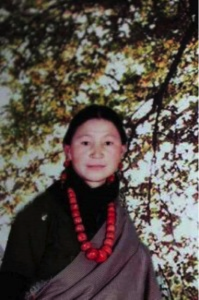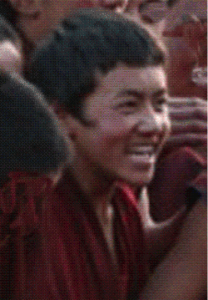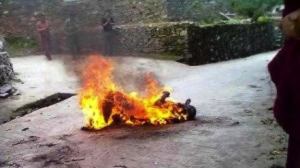Twin self-immolation
Name: Tashi
Age: 21
Sex: Male
Status: Layperson
Date of Self-immolation: 13 August 2012 at around 6:50 pm
Location: Ngaba, Amdo, Northeastern Tibet
Current whereabouts/wellbeing: Deceased 14 August
His slogans: Not reported
Name: Lungtok
Age: 20
Sex: Male
Profession: Monk
Date of Self-immolation: 13 August 2012 at around 6:50 pm
Location: Ngaba, Amdo, Northeastern Tibet
Current whereabouts/wellbeing: Deceased; same day
His slogans: Not reported
Tashi, a layman from the Soruma pastoral area in Choejema Township, and monk Lungtok, also from Soruma and a student in Kirti Monastery’s medical college, Ngaba, set fire to themselves in a prayer wheel enclosure within the monastery’s perimeter. According to a statement released by Kirti Monastery in Dharamshala, “Lungtok, with his body enveloped in flames, marched down Martyr’s Street raising slogans but was overpowered by Chinese security personnel before he could reach the crossroads. Eyewitnesses have said that Lungtok was alive when he was forcibly removed from the scene. Tashi was marching on the Martyr’s Street raising slogans when a number of Chinese security personnel surrounded him and started beating him,” the report said. “He was bundled in a vehicle and taken away.”
Both were initially taken to the county hospital but within half an hour they were transferred to the Prefecture hospital in Barkham. Both succumbed to their burn injuries later. While Lungtok passed away later that same day, Tashi passed away the following day. It is not known whether their bodies were returned to their families so last rites could be performed. A large contingent of armed police were deployed across the region to quell the fast-swelling protest by Tibetans shortly after the self-immolation protests. Reports emerging at the time confirmed that the Chinese security personnel randomly assaulted the Tibetans with spiked batons, leaving one protestor dead and many severely injured. In spite of this, local Tibetans visited monasteries to offer prayers for the deceased and also expressed solidarity to their family members.



